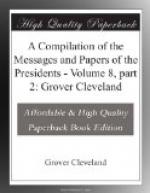On comparing the fourth section of the act of Congress passed March 31, 1814, providing for the indemnification of certain claimants of public lands in the Mississippi Territory, with the article of agreement and cession between the United States and State of Georgia, bearing date April 30, 1802, it appears that the engagements entered into with the claimants interfere with the rights and interests secured to that State. I recommend to Congress that provision be made by law for payments to the State of Georgia equal to the amount of Mississippi stock which shall be paid into the Treasury until the stipulated sum of $1,250,000 shall be completed.
JAMES MADISON.
VETO MESSAGE.
MARCH 3, 1817.
To the House of Representatives of the United States:
Having considered the bill this day presented to me entitled “An act to set apart and pledge certain funds for internal improvements,” and which sets apart and pledges funds “for constructing roads and canals, and improving the navigation of water courses, in order to facilitate, promote, and give security to internal commerce among the several States, and to render more easy and less expensive the means and provisions for the common defense,” I am constrained by the insuperable difficulty I feel in reconciling the bill with the Constitution of the United States to return it with that objection to the House of Representatives, in which it originated.
The legislative powers vested in Congress are specified and enumerated in the eighth section of the first article of the Constitution, and it does not appear that the power proposed to be exercised by the bill is among the enumerated powers, or that it falls by any just interpretation within the power to make laws necessary and proper for carrying into execution those or other powers vested by the Constitution in the Government of the United States.
“The power to regulate commerce among the several States” can not include a power to construct roads and canals, and to improve the navigation of water courses in order to facilitate, promote, and secure such a commerce without a latitude of construction departing from the ordinary import of the terms strengthened by the known inconveniences which doubtless led to the grant of this remedial power to Congress.
To refer the power in question to the clause “to provide for the common defense and general welfare” would be contrary to the established and consistent rules of interpretation, as rendering the special and careful enumeration of powers which follow the clause nugatory and improper. Such a view of the Constitution would have the effect of giving to Congress a general power of legislation instead of the defined and limited one hitherto understood to belong to them, the terms “common defense and general welfare” embracing every object and act within the purview of a legislative




